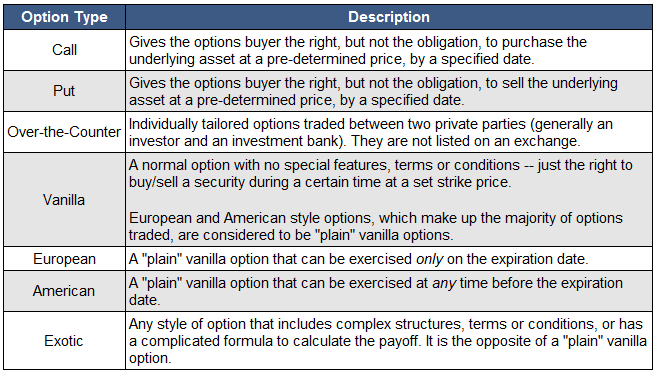What is an Option?
An option is a financial contract that gives an investor the right, but not the obligation, to either buy or sell an asset at a pre-determined price (known as the strike price) by a specified date (known as the expiration date).
How Does an Option Work?
Options are derivative instruments, meaning that their prices are derived from the price of their underlying security, which could be almost anything: stocks, bonds, currencies, indexes, commodities, etc. Many options are created in a standardized form and traded on an options exchange like the Chicago Board Options Exchange (CBOE), although it is possible for the two parties to an options contract to agree to create options with completely customized terms.
There are two types of options: call options and put options. A buyer of a call option has the right to buy the underlying asset for a certain price. The buyer of a put option has the right to sell the underlying asset for a certain price.
Here's a brief look at a few of the most common types of options:

Every option represents a contract between the options writer and the options buyer.
The options writer is the party that 'writes,' or creates, the options contract, and then sells it. If the investor who buys the contract chooses to exercise the option, the writer is obligated to fulfill the transaction by buying or selling the underlying asset, depending on the type of option he wrote. If the buyer chooses to not exercise the option, the writer does nothing and gets to keep the premium (the price the option was originally sold for).
The options buyer has a lot of power in this relationship. He chooses whether or not they will complete the transaction. When the option expires, if the buyer doesn't want to exercise the option, he doesn't have to. The buyer has purchased the option to carry out a certain transaction in the future -- hence the name.
Why Does an Option Matter?
Investors use options for two primary reasons: to speculate and to hedge risk. Rational investors realize there is no 'sure thing,' as every investment incurs at least some risk. This risk is what the investor is compensated for when he or she purchases an asset.
Hedging is like buying insurance. It is protection against unforeseen events, but you hope you never have to use it. Should a stock take an unforeseen turn, holding an option opposite of your position will help to limit your losses.
If you'd like to read more in-depth information about options, check out these definitions:
Call Option -- Option to purchase the underlying asset.
Put Option -- Option to sell the underlying asset.
Options Contract -- The agreement between the writer and the buyer.
Expiration Date -- The last day an options contract can be exercised.
Strike Price -- The pre-determined price the underlying asset can be bought/sold for.
Intrinsic Value -- The current value of the option's underlying asset.
Time Value -- The additional amount that traders are willing to pay for an option.
Vanilla Option -- A normal option with no special features, terms or conditions.
American Option -- Option that can be exercised any time before the expiration date.
European Option -- Option that can be exercised only on the expiration date.
Exotic Option -- Any option with a complex structure or payoff calculation.



